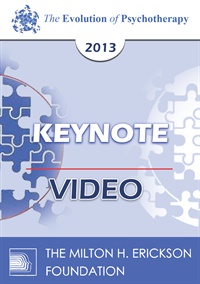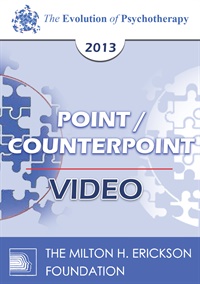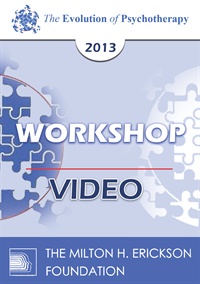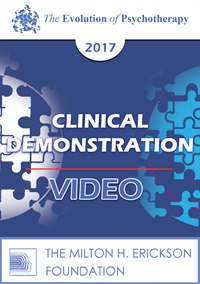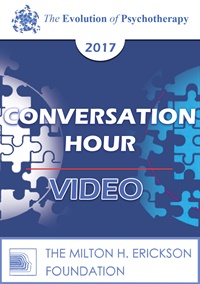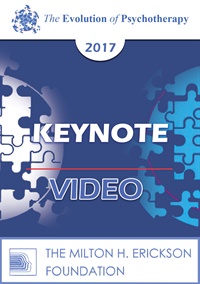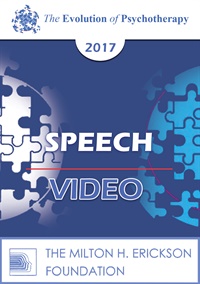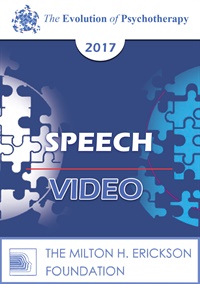- Average Rating:
- Not yet rated
- Topic Areas:
- Clinical Demonstrations | Psychology | Somatic Experiences | Psychotherapy
- Categories:
- Evolution of Psychotherapy | Evolution of Psychotherapy 2009
- Faculty:
- Robert Dilts, BA
- Course Levels:
- Master Degree or Higher in Health-Related Field
- Duration:
- 55:34
- Format:
- Audio and Video
- Original Program Date:
- Dec 12, 2009
- Short Description:
- Educational Objectives: To describe a simple, powerful method to help clients transform fear and resistance to deal more effectively with challenges. To describe the process of somatic centering to address challenging circumstances.
- Price:
-
Sale is $29.00
price reduced from Base Price - $59.00
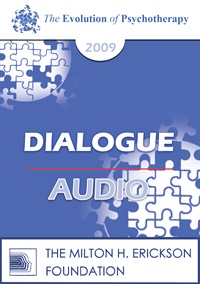
- Average Rating:
- Not yet rated
- Topic Areas:
- Psychology | Dialogues | Positive Psychology | Psychotherapy
- Categories:
- Evolution of Psychotherapy | Evolution of Psychotherapy 2009
- Faculty:
- David Barlow, PhD | Martin Seligman, PhD
- Duration:
- 1 Hour
- Format:
- Audio Only
- Original Program Date:
- Dec 12, 2009
- Short Description:
- EP09 Dialogue 13 – Positive Psychology and Evidence-Based Practice of Psychology – David Barlow, PhD and Martin Seligman, PhD Educational Objective: Given a topic, to describe the differing approaches to psychotherapy, and to identify the strengths and weaknesses of each approach.
- Price:
- $15.00 - Base Price
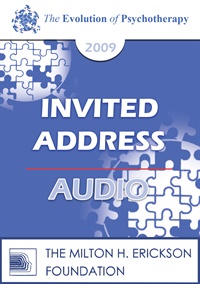
- Average Rating:
- Not yet rated
- Topic Areas:
- Psychology | Invited Addresses | Positive Psychology | Psychotherapy
- Categories:
- Evolution of Psychotherapy | Evolution of Psychotherapy 2009
- Faculty:
- Martin Seligman, PhD
- Duration:
- 58 Minutes
- Format:
- Audio Only
- Original Program Date:
- Dec 12, 2009
- Short Description:
- EP09 Invited Address 07 – Advances in Positive Psychology – Martin Seligman, PhD This address will present belief in one’s causative power as the foundation of human motivation, aspiration, accomplishments, and well-being. Whatever other factors serve as guides and motivators, they are rooted in the core belief that one has the power to make changes in one’s functioning and life conditions.
- Price:
- $15.00 - Base Price
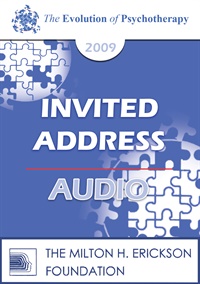
- Average Rating:
- Not yet rated
- Topic Areas:
- Invited Addresses | Psychology | Psychotherapy
- Categories:
- Evolution of Psychotherapy | Evolution of Psychotherapy 2009
- Faculty:
- Jean Houston, PhD
- Duration:
- 58 Minutes
- Format:
- Audio Only
- Original Program Date:
- Dec 13, 2009
- Short Description:
- Dr. Houston will offer ways and means to profoundly make a difference for the betterment of people, communities, organizations and cultures worldwide. Drawing on her work in over 100 countries in training leaders in human development in the light of social change, she will offer liberating thought ways, as well as techniques of activating human and social potentials in sensory, psychological, mythic and symbolic, as well as, spiritual and integral levels of the human capacity. Together, these lead to enhanced abilities to creatively and effectively deal with present challenges. Dr. Houston will address the unique place that present movements in psychology have to offer in a world of radical shifts.
- Price:
- $15.00 - Base Price
Tags: Psychology Psychotherapy
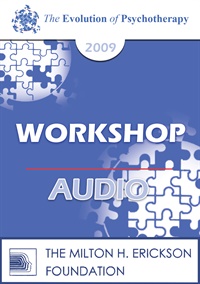
- Average Rating:
- Not yet rated
- Topic Areas:
- Psychology | Workshops | Meditation, Spirituality and Yoga | Multicultural | Psychotherapy | Storytelling
- Categories:
- Evolution of Psychotherapy | Evolution of Psychotherapy 2009
- Faculty:
- Jean Houston, PhD
- Duration:
- 2 Hours 41 Minutes
- Format:
- Audio Only
- Original Program Date:
- Dec 09, 2009
- Short Description:
- Drawing on the findings of her own mythic life and work in over 100 countries, 40 cultures, and with leaders the world over, Dr. Houston will offer a workshop rare for its ability to evoke new ways of being through the consideration of the dynamics of both old and emergent myths and stories of transformation. Participants will experience state of the art methods in experiencing sensory, psychological, symbolic and spiritual growth, and discovery in ways both practical and profound. Liberating thoughtways, shifts in perception and understanding, and growth in capacity will enable the participant to take these discoveries back to his or her own clients, communities and organizations. Full of music and high theatre, and often hilarious (Houston’s father wrote the joke, “Who’s on First?”), this workshop will explore the mystery of living in a time of whole system transition when what we can do as individuals can make a significant difference in the lives of many.
- Price:
- $15.00 - Base Price
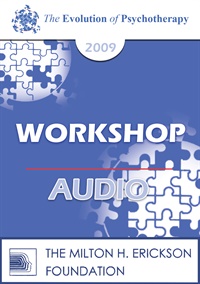
- Average Rating:
- Not yet rated
- Topic Areas:
- Neuroscience | Psychology | Workshops | Meditation, Spirituality and Yoga | Mindfulness | Buddhism | Psychotherapy | Attunement
- Categories:
- Evolution of Psychotherapy | Evolution of Psychotherapy 2009
- Faculty:
- Jack Kornfield, PhD | Daniel Siegel, MD
- Duration:
- 2 Hours 50 Minutes
- Format:
- Audio Only
- Original Program Date:
- Dec 09, 2009
- Short Description:
- There is a vast wisdom describing the capacity for self-transformation and healing central to Buddhist psychology, now a focus of current neuroscience research as well. We will delineate the principles and clinical/therapeutic applications of mindfulness, compassion and forgiveness trainings, attunement, mental health and well being, as well as the profound shift of identity that has parallels in eastern psychology and recent neuroscience research. We will explore the wedding of a spiritual psychology of the heart in tune with clinically sound modern science.
- Price:
- $15.00 - Base Price
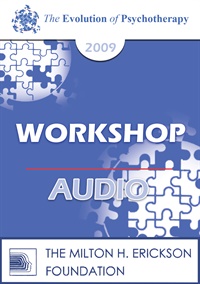
- Average Rating:
- Not yet rated
- Topic Areas:
- Psychology | Workshops | Positive Psychology | Depression | Happiness | Psychotherapy
- Categories:
- Evolution of Psychotherapy | Evolution of Psychotherapy 2009
- Faculty:
- Martin Seligman, PhD
- Duration:
- 2 Hours 6 Minutes
- Format:
- Audio Only
- Original Program Date:
- Dec 12, 2009
- Short Description:
- Happiness can be usefully dissolved into the Pleasant Life (Positive Emotions), the Engaged Life, and the Meaningful Life.The mission of Positive Psychology is to understand and build these three lives. Dr. Seligman will describe interventions that raise happiness, so defined, and will detail their effects on depression.
- Price:
- $15.00 - Base Price
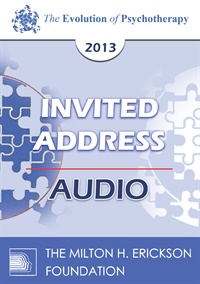
- Average Rating:
- Not yet rated
- Topic Areas:
- Psychology | Invited Addresses | Psychotherapy
- Categories:
- Evolution of Psychotherapy | Evolution of Psychotherapy 2013
- Faculty:
- David Barlow, PhD
- Duration:
- 58:07
- Format:
- Audio Only
- Original Program Date:
- Dec 14, 2013
- Short Description:
- For more than sixty years in clinical psychology we have attempted to integrate science into practice for the benefit of the public. After a brief review of the progress we have made and the reasons for the emergence of evidence-based practice, we will consider current barriers to dissemination and implementation. These include the relative (in) efficacy of current psychological interventions, issues of comorbidity and heterogeneity of psychopathology, the ambiguity concerning mechanisms of action in treatments, a continuing emphasis on nomothetic rather than idiographic methodology, and emerging issues of implementation in clinical settings.
- Price:
- $15.00 - Base Price
- Average Rating:
- Not yet rated
- Topic Areas:
- Psychology | Keynotes | Positive Psychology | Psychotherapy
- Categories:
- Evolution of Psychotherapy | Evolution of Psychotherapy 2013
- Faculty:
- Martin Seligman, PhD
- Course Levels:
- Master Degree or Higher in Health-Related Field
- Duration:
- 57:25
- Format:
- Audio and Video
- Original Program Date:
- Dec 15, 2013
- Short Description:
- Positive Psychology measures and attempts to build PERMA: Positive Emotion, Engagement, Relationships, Meaning, and Accomplishment. I present recent findings from individuals, the clinic, organizations, and nations, as well as evidence-based techniques for building PERMA.
- Price:
-
Sale is $29.00
price reduced from Base Price - $59.00
- Average Rating:
- Not yet rated
- Topic Areas:
- Psychology | Point/Counterpoint Sessions | Existential Therapy | Psychotherapy
- Categories:
- Evolution of Psychotherapy | Evolution of Psychotherapy 2013
- Faculty:
- Jean Houston, PhD | Ernest Rossi, PhD | Camillo Loriedo, MD, PhD
- Course Levels:
- Master Degree or Higher in Health-Related Field
- Duration:
- 1:23:46
- Format:
- Audio and Video
- Original Program Date:
- Dec 11, 2013
- Short Description:
- So many books and seminars have emerged over the last decade with discovering one’s “purpose” as their theme. What are the cultural and historic reasons for this, given the unique shifts and challenges of our time? How do we engender the passion for the possible in our human development while discovering what that “possible” is? Is it even possible to become an artist of destiny, capable of decoding the patterns, clues, and relationships that point you to a mystery that cannot be known directly? Ultimately when it comes down to our fascination with purpose, are we fooling ourselves or are we present at the birth of an opportunity that exceeds our imagination.
- Price:
-
Sale is $29.00
price reduced from Base Price - $59.00
- Average Rating:
- Not yet rated
- Topic Areas:
- Psychotherapy | Point/Counterpoint Sessions | Consciousness | Mind-Body | Psychology | Therapist Development
- Categories:
- Evolution of Psychotherapy | Evolution of Psychotherapy 2013 | Pioneers in Couples and Family Therapy
- Faculty:
- Ernest Rossi, PhD | Cloe Madanes, HDL, LIC | Richard Landis, PhD
- Course Levels:
- Master Degree or Higher in Health-Related Field
- Duration:
- 1:23:25
- Format:
- Audio and Video
- Original Program Date:
- Dec 12, 2013
- Short Description:
- Facilitating the RNA/DNA epigenetics of creating new consciousness is the next step in the evolution of psychotherapy. Restricting psychotherapy to the limitations of the cognitive-behavioral level is becoming a disservice to psychology. We must embrace the bioinformatics of the new technological devices that make it possible to assess and facilitate the dynamics of gene expression and brain plasticity economically within a single session of psychotherapy.
- Price:
-
Sale is $29.00
price reduced from Base Price - $59.00
- Average Rating:
- Not yet rated
- Topic Areas:
- Workshops | Meditation, Spirituality and Yoga | Psychology | Mindfulness | Buddhism | Psychotherapy
- Categories:
- Evolution of Psychotherapy 2013 | Evolution of Psychotherapy
- Faculty:
- Jack Kornfield, PhD
- Course Levels:
- Master Degree or Higher in Health-Related Field
- Duration:
- 2:51:15
- Format:
- Audio and Video
- Original Program Date:
- Dec 14, 2013
- Short Description:
- In this workshop we will explore the principles and practices of Buddhist Psychology, and how mindfulness, compassion and related practices can be applied in clinical and pragmatic ways in the West. Through teachings, case studies, stories and guided trainings, we will learn the positive strengths of these powerful approaches and experience a taste of their benefits.
- Price:
-
Sale is $29.00
price reduced from Base Price - $59.00
- Average Rating:
- Not yet rated
- Topic Areas:
- Workshops | Social Psychology | Psychotherapy | Psychology
- Categories:
- Evolution of Psychotherapy 2013 | Evolution of Psychotherapy
- Faculty:
- Bill O'Hanlon, MS
- Course Levels:
- Master Degree or Higher in Health-Related Field
- Duration:
- 1:40:33
- Format:
- Audio and Video
- Original Program Date:
- Dec 15, 2013
- Short Description:
- Marketers are learning about and using the latest research on how to persuade people to change their views and behavior, but psychotherapists generally don’t know about or use this research. This session, using videos, audios and stories to bring the material alive, will teach you three powerful methods for radically increasing cooperation in therapy.
- Price:
-
Sale is $29.00
price reduced from Base Price - $59.00
Credit available - Click Here for more information
- Average Rating:
- Not yet rated
- Topic Areas:
- Clinical Demonstrations | Psychotherapy | Psychology | Therapist Development
- Categories:
- Evolution of Psychotherapy | Evolution of Psychotherapy 2017 | Online Continuing Education
- Faculty:
- Steven Hayes, PhD
- Course Levels:
- Master Degree or Higher in Health-Related Field
- Duration:
- 57:37
- Format:
- Audio and Video
- Original Program Date:
- Dec 15, 2017
- Short Description:
- Psychological flexibility is one of the most studied and supported set of mediational processes in clinical intervention science. In this demonstration I will explain and then demonstrate how a focus on evidence-based flexibility processes in therapy can free clinicians from the linear march of protocol-based approaches, and foster instead a vital dance of creative facilitation of change, played out in the moment to moment context of an empowering therapeutic relationship that is nevertheless thoroughly evidence-based.
- Price:
-
Sale is $29.00
price reduced from Base Price - $59.00
Credit available - Click Here for more information
- Average Rating:
- Not yet rated
- Topic Areas:
- Conversation Hours | Positive Psychology | History of Psychotherapy | Psychology | Psychotherapy
- Categories:
- Evolution of Psychotherapy | Evolution of Psychotherapy 2017 | Online Continuing Education
- Faculty:
- Martin Seligman, PhD
- Course Levels:
- Master Degree or Higher in Health-Related Field
- Duration:
- 1:00:51
- Format:
- Audio and Video
- Original Program Date:
- Dec 16, 2017
- Short Description:
- I will review the past, present, and future of Learned Helplessness, Preparedness, Learned Optimism, Prospective Psychology and Positive Psychology.
- Price:
-
Sale is $29.00
price reduced from Base Price - $59.00
Credit available - Click Here for more information
- Average Rating:
- Not yet rated
- Topic Areas:
- Keynotes | Positive Psychology | Psychology | Psychotherapy
- Categories:
- Evolution of Psychotherapy | Evolution of Psychotherapy 2017 | Online Continuing Education
- Faculty:
- Martin Seligman, PhD
- Course Levels:
- Master Degree or Higher in Health-Related Field
- Duration:
- 1:01:48
- Format:
- Audio and Video
- Original Program Date:
- Dec 15, 2017
- Short Description:
- Seligman will review cutting edge research, techniques, and applications in Positive Psychology, Positive Psychotherapy, and Positive Education.
- Price:
-
Sale is $29.00
price reduced from Base Price - $59.00
Credit available - Click Here for more information
- Average Rating:
- Not yet rated
- Topic Areas:
- Speeches | Meditation, Spirituality and Yoga | Mindfulness | Psychology | Buddhism | Psychotherapy
- Categories:
- Evolution of Psychotherapy | Evolution of Psychotherapy 2017 | Online Continuing Education
- Faculty:
- Jack Kornfield, PhD
- Course Levels:
- Master Degree or Higher in Health-Related Field
- Duration:
- 57:11
- Format:
- Audio and Video
- Original Program Date:
- Dec 15, 2017
- Short Description:
- In this session we will explore the wise and loving perspectives of Buddhist Psychology. These transformative teachings and practices can awaken in clients and therapists alike an inner capacity for wakefulness, joy, dignity, and compassion—Buddha-nature. Combining practical and clinical examples, teaching stories, and innate wisdom we will consider the heart of healing, love, consciousness and the nature of mind.
- Price:
-
Sale is $29.00
price reduced from Base Price - $59.00
Credit available - Click Here for more information
- Average Rating:
- Not yet rated
- Topic Areas:
- Speeches | Memory | Continuing Education | Psychology | Psychotherapy
- Categories:
- Evolution of Psychotherapy | Evolution of Psychotherapy 2017 | Online Continuing Education
- Faculty:
- Elizabeth Loftus, PhD
- Course Levels:
- Master Degree or Higher in Health-Related Field
- Duration:
- 56:41
- Format:
- Audio and Video
- Original Program Date:
- Dec 16, 2017
- Short Description:
- For several decades, I have been manufacturing memories in unsuspecting minds. People can be led to believe that they did things that would have been rather implausible. They can be led to falsely believe that they had experiences that would have been emotional or traumatic had they actually happened. False memories, like true ones, also have consequences for people, affecting later thoughts, intentions, and behaviors. Can we tell true memories from false ones? In several studies, I created false memories in the minds of people, and then compared them to true memories. Once planted, the false memories look very much like true memories—in terms of behavioral characteristics, emotionality and neural signatures. If false memories can be so readily planted in the mind, do we need to think about “regulating” this mind technology? And what do these pseudo memories say about the nature of memory itself?
- Price:
-
Sale is $29.00
price reduced from Base Price - $59.00
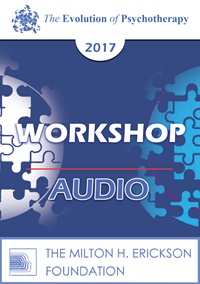
- Average Rating:
- Not yet rated
- Topic Areas:
- Workshops | Psychotherapy | Positive Psychology | Psychology
- Bundle(s):
- Learning Track - EP17 Erickson Download
- Categories:
- Evolution of Psychotherapy | Evolution of Psychotherapy 2017 | Evolution of Psychotherapy Erickson Learning Track
- Faculty:
- Stephen Gilligan, PhD
- Course Levels:
- Master Degree or Higher in Health-Related Field
- Duration:
- 2:01:32
- Format:
- Audio Only
- Original Program Date:
- Dec 13, 2017
- Short Description:
- A central currency in the therapeutic exchange is negative experiences--depression, anxiety, trauma, addiction, etc. This practical and positive approach assumes that each core human experience has equivalent potential to be positive or negative, depending on the human relationship to it; and thus focuses on how problems may be transformed to resources by skillful human connection. This process operates at two levels: (1) developing a generative state (in the therapist, client, and relationship field) and then (2) using specific methods of transforming negative experiences and behaviors. Multiple techniques and examples for will be given, along with an exercise and demonstration.
- Price:
- $15.00 - Base Price
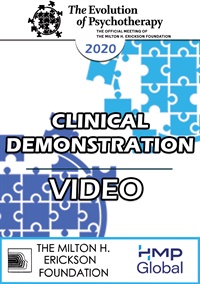
- Average Rating:
- Not yet rated
- Topic Areas:
- Cognitive Behavior Therapy (CBT) | Clinical Demonstrations | Psychology | Psychotherapy | Acceptance and Commitment Therapy (ACT)
- Categories:
- Evolution of Psychotherapy | Evolution of Psychotherapy 2020
- Faculty:
- Steven Hayes, PhD
- Course Levels:
- Master Degree or Higher in Health-Related Field
- Duration:
- 1 hour
- Format:
- Audio and Video
- Original Program Date:
- Dec 12, 2020
- Short Description:
- In this short series of actual client "real plays" I will show what process-based ACT looks like, and relate clinical methods to the psychological flexibility model as integrating into a multi-dimensional, multi-level extended evolutionary meta-model.
- Price:
-
Sale is $29.00
price reduced from Base Price - $59.00
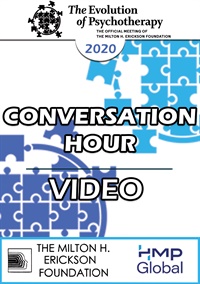
- Average Rating:
- Not yet rated
- Topic Areas:
- Conversation Hours | Positive Psychology | Psychology
- Categories:
- Evolution of Psychotherapy | Evolution of Psychotherapy 2020
- Faculty:
- Martin Seligman, PhD
- Course Levels:
- Master Degree or Higher in Health-Related Field
- Duration:
- 57:24
- Format:
- Audio and Video
- Original Program Date:
- Dec 01, 2020
- Short Description:
- EP20 Conversation Hour 03 - The Past, Present, and Future of Positive Psychology - Martin Seligman, PhD
- Price:
- $59.00 - Base Price
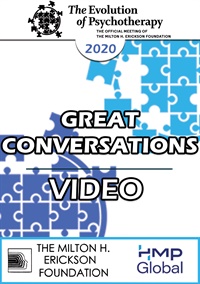
- Average Rating:
- Not yet rated
- Topic Areas:
- Psychology | Social Psychology | Great Conversations | Memory
- Categories:
- Evolution of Psychotherapy | Evolution of Psychotherapy 2020
- Faculty:
- Elizabeth Loftus, PhD | Michael Yapko, PhD
- Course Levels:
- Master Degree or Higher in Health-Related Field
- Duration:
- 1 hour 31 minutes
- Format:
- Audio and Video
- Original Program Date:
- Dec 10, 2020
- Short Description:
- Can we tell true memories from false ones? In several studies, these created false memories in the minds of people, were then compared to true memories.. Once planted, the false memories look very much like true memories—in terms of behavioral characteristics, emotionality and neural signatures. If false memories can be so readily planted in the mind, do we need to think about “regulating” this mind technology? And what do these pseudomemories say about the nature of memory itself?
- Price:
-
Sale is $29.00
price reduced from Base Price - $59.00
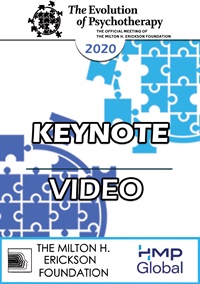
- Average Rating:
- Not yet rated
- Topic Areas:
- Psychology | Social Psychology | Keynotes
- Categories:
- Evolution of Psychotherapy | Evolution of Psychotherapy 2020
- Faculty:
- Philip Zimbardo, PhD
- Course Levels:
- Master Degree or Higher in Health-Related Field
- Duration:
- 2 hours
- Format:
- Audio and Video
- Original Program Date:
- Dec 09, 2020
- Short Description:
- This lecture traces his journey from childhood through the Stanford Prison Experiment on the theme of the banality of evil, then switches to focus on the banality of heroism in his new life’s mission of training people around the world be wise and effective heroes who stand up, speak out and take action in challenging situations in their lives, as part of the Heroic Imagination Project.
- Price:
-
Sale is $29.00
price reduced from Base Price - $59.00
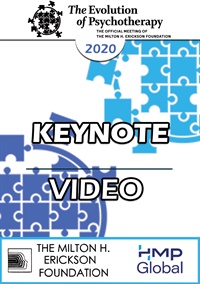
- Average Rating:
- Not yet rated
- Topic Areas:
- Positive Psychology | Psychology | Keynotes
- Bundle(s):
- EP20 Highlights
- Categories:
- Evolution of Psychotherapy | Evolution of Psychotherapy 2020
- Faculty:
- Martin Seligman, PhD
- Course Levels:
- Master Degree or Higher in Health-Related Field
- Duration:
- 1 hour 7 minutes
- Format:
- Audio and Video
- Original Program Date:
- Dec 11, 2020
- Short Description:
- Join the father of Positive Psychology in this session as we explore the world history of Agency and its relation to the past, present, and future of Positive Psychology, Positive Education, and Positive Psychotherapy. Highlighted concepts will include PERMA, Causal Intervention, Well-being, Future Mindedness, Learned Optimism, and Learned Helplessness, among others. How are the Age of Progress and Positive Psychology related? What possibilities could arise from effectively using Positive Psychology in overcoming personal and global challenges? Attendees will be able to define, understand, and potentially implement Positive Psychology in their professional setting.
- Price:
-
Sale is $29.00
price reduced from Base Price - $59.00
Tags: EP20 Highlight
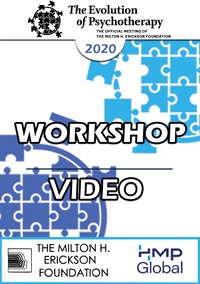
- Average Rating:
- Not yet rated
- Topic Areas:
- Trauma | Workshops | Art and Creativity | Social Psychology | Polyvagal Theory | Psychotherapy | Music | Psychology
- Categories:
- Evolution of Psychotherapy | Evolution of Psychotherapy 2020
- Faculty:
- Stephen Porges, PhD
- Course Levels:
- Master Degree or Higher in Health-Related Field
- Duration:
- 2 hours
- Format:
- Audio and Video
- Original Program Date:
- Dec 09, 2020
- Short Description:
- This presentation will focus on how Polyvagal Theory provides a plausible model to explain how and why intonation of voice and vocal music can support mental and physical health and enhance function during compromised states associated with illness, chronic stress, and trauma. The workshop will elaborate on the principles incorporated in the Safe and Sound Protocol™ and the lessons learned through preliminary clinical trials, current research, and feedback from clinicians applying the protocol to various clinical disorders including individuals with severe trauma histories.
- Price:
-
Sale is $29.00
price reduced from Base Price - $59.00



